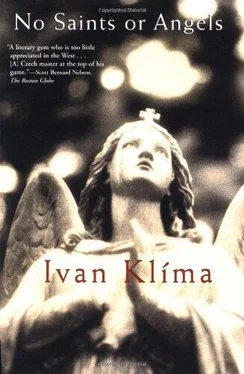'It's only too late when you're dead.'
'But the marks are already in. Really.'
I don't want to be a restrictive or repressive parent. I had enough of Dad's restrictions at home and I don't think I've got over them yet. But what will become of this child if I don't manage to arouse any sense of responsibility in her?
'You're not hiding anything from me?'
'Mummy. .!'
'Don't try to butter me up; I want an answer.'
'I'm not hiding anything from you.'
'Will you call me after the demonstration and tell me how you got on with the skinheads?'
'Of course. If the skins don't do me over I'll call you from the first phone box.'
'And if I let you go to Katya's, you're to be back by tomorrow afternoon at the latest.'
Instead of making promises she won't keep anyway, she flings her arms round my neck and tells me I'm a fantastic mother. Then she loads herself down with chains and rings of various kinds, daubs herself with war paint and makes her exit from the flat, and before she reaches the front door she has already forgotten about it and her mother.
The remains of the day now leer at me.
I water the rubber plant and remove two yellow leaves. I load the washing machine and give the windowledges above the radiators a wipe. I ought to cook something, but I don't enjoy cooking for myself alone. For a moment I consider going over to my ex-husband's and cooking him something at least, but I can't make up my mind to do it. I'm a lazy Samaritan. I call Mum to ask how she is. We talk for a while and Mum tells me her dreams. I listen to her patiently, knowing that these days dreams are
increasingly what affect her the most, now that life has little excitement or comfort to offer.
'What about Jana?' Mum wants to know.
I tell her she has gone to demonstrate against racism.
'And you let her go? She could get hurt.'
I try to explain to her that it is necessary to protest against evil, but I fail to convince her.
'It's no business of children,' she tells me. 'At least you should have gone with her.'
Maybe she's right, but the thought of festooning myself with chains and going to yell slogans makes me smile.
I switch on the news at midday to learn that the police have broken up a gang of traffickers, that strike action is planned by lorry drivers, teachers and state employees, that eight people have died from the heat, although I don't catch where, and that a locomotive caught fire on some railway line. No mention of any anti-racist demonstration. They either didn't know about it or they have no interest. They'd only be interested if there were violent clashes. Maybe there isn't any anti-racist demonstration today, and my daughter just made it up as a way of getting out of the house as soon as possible.
I can't help thinking she has deceived me.
People tell lies: Dad lied to us, my ex-husband lied to me, my long-lost lover lied to me. Why should my daughter be any better?
She didn't hesitate to forge my signature at school and even boasted about how well she did it. And I'd like so much to trust her, to trust everyone, or those people, at least, that matter to me.
I make myself a cheese roll and pour myself a glass of wine. I finish my lunch in five minutes and then make a dash for the metro.
It is boiling on Old Town Square. Tourists cluster around an ice-cream trolley. In front of the astronomical clock a crowd waits in the scorching heat for the apostles, who make their appearance come rain or shine. There is no one to ask where the anti-racist
demonstration will take place. If it were to take place here it would be drowned in waves of Coca-Cola and lost amidst the crowds of pagans, as tourists are described by my Mickey Myšák who has gone swanning off to Brno and left me at the mercy of the pagans.
There are too many people. Apparently there'll soon be six billion of us, I recently read.
While I was still at university I managed to visit London — thanks, no doubt, to Dad's unimpeachable political record. That was the first time I became aware of masses of people, a universe full of human beings whom I'll never know, never speak to and never understand. Ever since then I've been afraid of those masses, especially when I see people bunched together so tightly that they touch shoulders.
I can go and sit down on the steps by the Hus memorial and wait. I can go home and wait and wait — what for, who for, in fact?
We await salvation, which has departed from us. A line of verse crosses my mind, goodness knows where from, the Bible maybe. Perhaps I heard it some Sunday when I was attending church to spite my father.
The narrow lanes of the Old Town offer some shade at least and to my surprise I find an empty telephone booth.
I insert the phone card and hesitate before dialling the number.
A woman answers the phone. She's not particularly old by the sound of her voice; but then why should she be? His mother needn't be much older than I am, and my voice hasn't aged — or at least so I tell myself.
I overcome the temptation to hang up without saying anything; I introduce myself and ask after her son, my lover.
'Hold the line, please, Miss. I'll call him.'
It is stiflingly hot in the phone booth and his 'Miss' is bathed in sweat.
'It's me, Kristýna.'
'I recognize your voice, of course.'
'You haven't left yet?' I ask stupidly
'No, I'm leaving in an hour.'
'What will you be doing in the meantime?'
'I was making a few more notes.'
A moment's silence and then he asks, 'And what are you doing?'
'Walking around Prague.' And I'm miserable — I don't say.
'I thought you said you'd be with your daughter.'
'She's out. She told me she was going to some demonstration and then to some cottage with a girlfriend.'
'And you're home alone?'
'I'm not at home. I'm walking around Prague. I went to have a look at that demonstration but I couldn't find her. The place is so crowded it's impossible to find anybody, not even a demonstration.'
'Do you think we could meet for a short while?'
'But you'll be leaving soon.'
'Where are you now?'
I tell him truthfully that I'm in a phone booth.
He wants to know where I'll go after I hang up, but I don't know.
'So try and help me to find you.'
'You won't have time anyway'
'But I won't go to the seminar if I've got a chance to be with you.'
I'm touched by his words. I'm touched that he gives me precedence over something that's bound to be important for his career. For a moment I'm unable to speak, then I simply say, 'You're crazy. You'll only regret it if you stay here.'
We talk it over for a bit longer, then we agree to meet in an hour in front of the National Theatre. I hang up.
My hair is matted and my blouse is sodden with sweat. I didn't really put on any make-up. I'm wearing the old threadbare skirt I wear at home. I rushed out without changing into something
else. How did it ever occur to me to make a date with him looking like this? He's bound to be fed up that he didn't go on my account. Maybe he's already regretting it.
I'd make a bad violinist because my hand would shake when I performed, even though it's usually firm. I used to get butterflies when I started going out with my first and only husband. Before every date I'd be terrified he wouldn't turn up. I was afraid, even though I was still a beauty — or so fellows told me, and Karel assured me too. I was terrified of falling out of favour, as if it were my job to be anxious and fearful for our love. I never entirely rid myself of that fear, even though I knew I was stronger.
If I make a dash to the metro I'll still have time to get home, have a shower and change. I can take a taxi back. On the other hand I could phone my lover back and tell him to go to his seminar instead. Or I could invite him straight home.
Читать дальше












